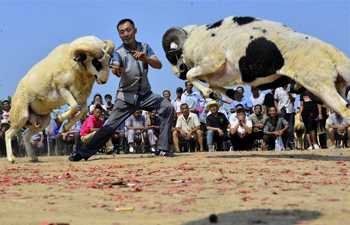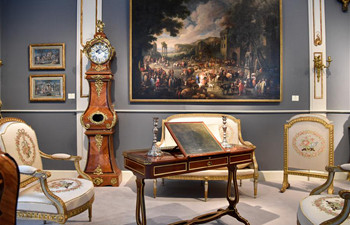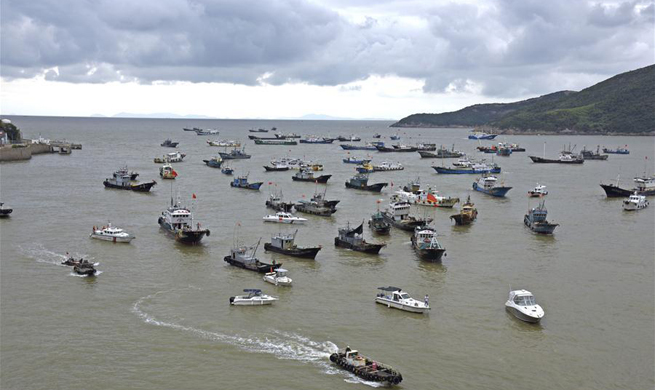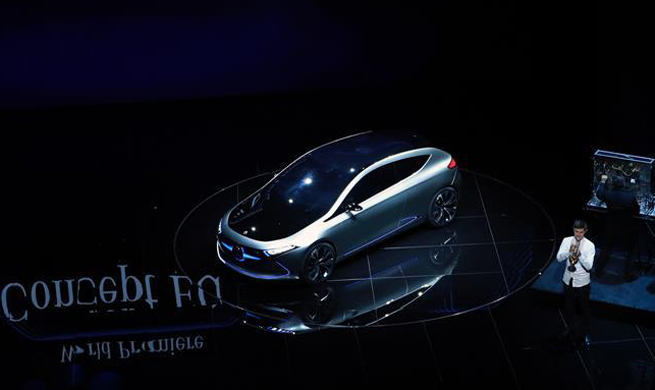by Maria Vasileiou
THE HAGUE, Sept. 12 (Xinhua) -- Less than two weeks until federal elections in Germany on Sept. 24, experts in Brussels and the Hague agree the electoral outcome will speed up the discussion on eurozone reforms, but doubt whether it will mark the beginning of real progress towards a more integrated European Union (EU), as French and German perceptions of European, and in particular, eurozone integration diverge.
"Discussion about eurozone reform might speed up after elections in Germany because the outgoing German government did not wish to start such negotiations shortly before the elections and French President," Zsolt Darvas, senior fellow at the Brussels-based think tank Bruegel, told Xinhua.
Darvas believed Germany's approach towards the EU would probably look familiar with Chancellor Angela Merkel likely to lead a coalition into power for a fourth term. "The composition of the parliament will remain much the same, while Angela Merkel will continue to be the Chancellor and the government will not change much either, meaning that there will be a similar approach to German positions after the elections."
Pre-election polls show that Merkel's conservative Christian Democratic Union (CDU) party with its sister Bavarian Christian Social Union (CSU) party has a comfortable lead and is likely to win most of the seats in the 598-seat Bundestag, the German federal parliament. Merkel's main challenger, former European Parliament president Martin Schulz, who leads the Social Democrats (SPD), is in second place.
"The question is not who will become the next chancellor, but how Germany will decide to influence the future of the European Union after the elections," said Adriaan Schout, senior research fellow at Clingendael, the Dutch institute for international relations.
Schout said that in contrast to elections held in the Netherlands earlier this year, and the battle for the French presidency, "what is at stake in the German election is not the euro nor the existence of the EU since both Merkel and Schulz are pro-European, but the Union's future design."
The French president, who has pledged for a "radical reform" of Europe, has made calls for a eurozone budget that would finance investments and stabilize the European economy during crises, as well as a eurozone finance minister and parliament.
Merkel has backed Macron's proposals for a eurozone budget, but only a "small" one. She also backed the idea of a finance minister, but remains opposed to any pooling of eurozone debt.
For Daniel Gros, director of the Centre for European Policy Studies (CEPS), Brussels "should not expect substantial changes, since what the Germans and what the French have in mind move in opposite directions."
"There might be a compromise on a common budget, but in reality it is going to be a small and not a large budget, as the French president has suggested," Gros said.
Referring to the prospect of a permanent finance minister, Darvas said, "the Eurogroup will have a permanent president, who might be called a eurozone minister of finance, but it is unlikely that such a position will entail significant new powers."
"Merkel will not want to give expansive powers to such a person, neither will the French," said Gros, "a eurozone finance minister will have limited powers."
According to Darvas, key issues to be discussed after the German elections include whether a meaningful euro-area wide fiscal stabilization instrument will be developed, whether some revenues would be centralized, whether Eurobonds would be introduced, and whether there would be an appropriate democratic control of such new institutions.
"My expectations are low," he added, saying he expected the banking union to only be completed "in several years." The eurozone has a central banking supervisor, the European Central Bank (ECB), but still needs to establish a common deposit insurance scheme.
As for the proposal of a European Monetary Fund (EMF) endorsed by the German chancellor to give the eurozone the ability to respond to crises without having to involve the Washington-based International Monetary Fund (IMF), both experts see it as just a change in the name of the existing European Stability Mechanism (ESM), the rescue facility set up in 2012 to cope with the eurozone crisis.
"I would not expect major changes to the treaty governing the ESM. It could be renamed as EMF, but that would mostly mean a change in the name," said Darvas.
Even if more powers are transferred from the European Commission to a new EMF, "there won't be a significant impact as decision-making in both bodies is dominated by member states," added Gros.
For Schout, a Franco-German axis will only be possible by striking compromises. "The eurozone is still in crisis as we haven't seen convergence of the bloc's economies, while fundamental rules are not respected and the German parties have failed to address this question during the elections campaign," he said.
"Merkel seems under pressure to strike fake compromises once again and agree with French president to take steps towards deeper integration, but it is not clear what is expected by more fiscal integration and a deeper political union," he added.

















